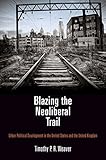Blazing the Neoliberal Trail : Urban Political Development in the United States and the United Kingdom / Timothy P. R. Weaver.
Material type: TextPublisher: Philadelphia : University of Pennsylvania Press, [2015]Copyright date: ©2016Description: 1 online resource (360 p.) : 1 illusContent type:
TextPublisher: Philadelphia : University of Pennsylvania Press, [2015]Copyright date: ©2016Description: 1 online resource (360 p.) : 1 illusContent type: - 9780812247824
- 9780812292220
- 320.51/3 23
- JC574.2.U6 W43 2016eb
- online - DeGruyter
- Issued also in print.
| Item type | Current library | Call number | URL | Status | Notes | Barcode | |
|---|---|---|---|---|---|---|---|
 eBook
eBook
|
Biblioteca "Angelicum" Pont. Univ. S.Tommaso d'Aquino Nuvola online | online - DeGruyter (Browse shelf(Opens below)) | Online access | Not for loan (Accesso limitato) | Accesso per gli utenti autorizzati / Access for authorized users | (dgr)9780812292220 |
Frontmatter -- Contents -- Introduction -- Part I. The Neoliberalization of National Urban Policy -- Chapter 1. Losing the Battle but Winning the War: The Story of the Federal Enterprise Zone Program That Never Was: 1980-1992 -- Chapter 2. Dealing with Those Inner Cities: The Neoliberal Turn in British Urban Policy -- Chapter 3. Blair and Clinton: A Third Way? -- Part II. Neoliberalism in the Trenches: Urban Politics in Philadelphia and London -- Chapter 4. Neoliberalism in the Trenches: Philadelphia 1951-1991 -- Chapter 5. ''America's Mayor'' Comes to Power in Philadelphia: The Consolidation of the Corporate City Under Ed Rendell -- Chapter 6. Neoliberalism by Design: Poverty and Plenty in London's Docklands -- Conclusion. The Neoliberal Persuasion -- Appendix -- Notes -- Index -- Acknowledgments
restricted access online access with authorization star
http://purl.org/coar/access_right/c_16ec
In Blazing the Neoliberal Trail, Timothy Weaver asks how and why urban policy and politics have become dominated, over the past three decades, by promarket thinking. He argues that politicians such as Ronald Reagan and Margaret Thatcher targeted urban areas as part of their far broader effort to remake the relationship between markets, states, and citizens. But while neoliberal policies were enacted in both the United States and the United Kingdom, Weaver shows that there was significant variation in the ways in which neoliberal ideas were brought to bear on institutional frameworks and organized interests. Moreover, these developments were not limited to a 1980s right-wing effort but were also advanced by Bill Clinton and Tony Blair, whose own agendas ultimately reinforced neoliberal ideas and practices, though often by default rather than design. The enduring impact of these shifts is evidenced today by the reintroduction of enterprise zones in the United Kingdom by Chancellor of the Exchequer George Osborne and by President Obama's announcement of Promise Zones, which, despite appearances, are cast in the neoliberal mold.By highlighting the bipartisan nature of the neoliberal turn, Weaver challenges the dominant narrative that the revival of promarket policies was primarily driven by the American GOP and the United Kingdom's Conservative Party. Drawing on extensive archival research and interviews with key political actors, Weaver examines national-level policies, such as enterprise zones-place-based articulations of neoliberal ideas-in case studies of Philadelphia and London. Through an investigation of national urban policy and local city politics, Blazing the Neoliberal Trail shows how elites became persuaded by neoliberal ideas and remade political institutions in their image.
Issued also in print.
Mode of access: Internet via World Wide Web.
In English.
Description based on online resource; title from PDF title page (publisher's Web site, viewed 30. Aug 2021)


